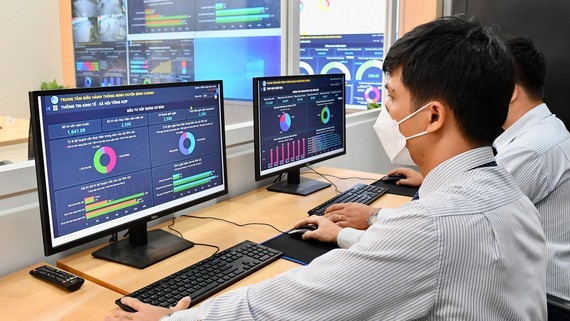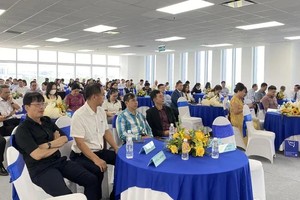
Despite being only 17 years old, D.H.M. has much experience in using popular apps like Gojet, Shopee to order food and pay bills via a bank account. Cases like this young person is not at all strange in Vietnam, where technology has gradually changed consumption habits of citizens, and people welcome cashless payment more and more.
Vietnam Electricyt Group (EVN) reported that it has a great quantity of customers, nearly 90 percent of whom are individuals in households. Its electricity services are linked to the National Population Database via the National Public Service e-Portal, and have so far served clients better when eliminating a lot of documents in administrative procedures thanks to the digital transformation. EVN also employs cashless payment via Mobile Money of the intermediary of VNPT, Viettel, MobiFone. The rate of cashless payment for EVN now accounts for 95 percent.
Similarly, Vietnam Social Security has completed its database for over 98 million Vietnamese citizens in 27 million households nationwide. It has introduced the app VssID – digital social security app – for participants to monitor their participation in social insurance and health insurance. The app has been downloaded and installed by more than 23 million users.
The Ministry of Public Security reported that until now, Project 06 has been implemented in all ministries and agencies, 63 provinces and municipalities. There have been over 5 million registrations for an electronic citizen identification account, and 65 million new chip-based citizen ID cards have been distributed. This is a strong foundation for the digital transformation process all over the nation. The Vietnamese can now easily manage their personal information included in their ID card online.
Deputy Director of the Center for National Population Database (C06) Nguyen Thanh Vinh said that to register for level 1 of an electronic citizen identification account, the public can download the app VNeID by the Public Security Ministry and follow the instruction there. Level 2 must be completed in person at a police station. This account is expected to be used in public transactions in the future.
At present, C06 and Vietnam Social Security are working to integrate the content of a health insurance card into a chip-based citizen ID card so that citizens can use their ID card to register for medical treatment in hospital under health insurance conveniently. VNeID also includes the information on vehicle registration certificate and driver license for the ease of traffic control.
However, one prominent challenge at the moment for the upgrading of personal information for all citizens and development of corresponding applications is the low IT infrastructure and the lack of equipment for the digital transformation process. It is also necessary to improve the institutions, mechanisms, policies on synchronization and data sharing among ministries, state agencies, local authorities.
Minister of Information and Communications Nguyen Manh Hung shared that digital transformation must be consistent from the central to local levels. There must be specialized teams sent to each household to aid needy people to use digital tools for their daily activities. It is these teams that can gradually transform every Vietnamese citizen into the digital version for a digital society in the future. These people with their own demands will in turn boost the growth of the domestic digital market for the formation of a sustainable digital economy.
At the moment, there are 40,000 such teams nationwide with 200,000 members. They are being trained as to digital skills so that they can transfer these skills to the community.
























